Property Law Assignment: Section 32, Contracts, and Covenants
VerifiedAdded on 2023/01/16
|7
|3223
|56
Homework Assignment
AI Summary
This assignment delves into various aspects of Victorian property law, analyzing scenarios related to the Sale of Land Act 1962. It examines the requirements of Section 32 statements, including necessary attachments like building permits and disclosure of essential services. The assignment explores the consequences of non-disclosure, including the right to rescind the contract and potential statutory offenses. It addresses issues such as the impact of a damaged bird bath on a contract, the conversion of a life tenancy to a fee simple estate, and the implications of restrictive covenants. Furthermore, it covers duty calculations, the application of caveat emptor, the process of accepting title, and the role of requisitions. The assignment also touches on private sales, transfers made according to a will, joint tenancy, and the jurisdiction of the Victorian Civil and Administrative Tribunal (VCAT) in domestic building disputes. Finally, it also focuses on the disclosure requirements for building structures and the implications of insurance policies.
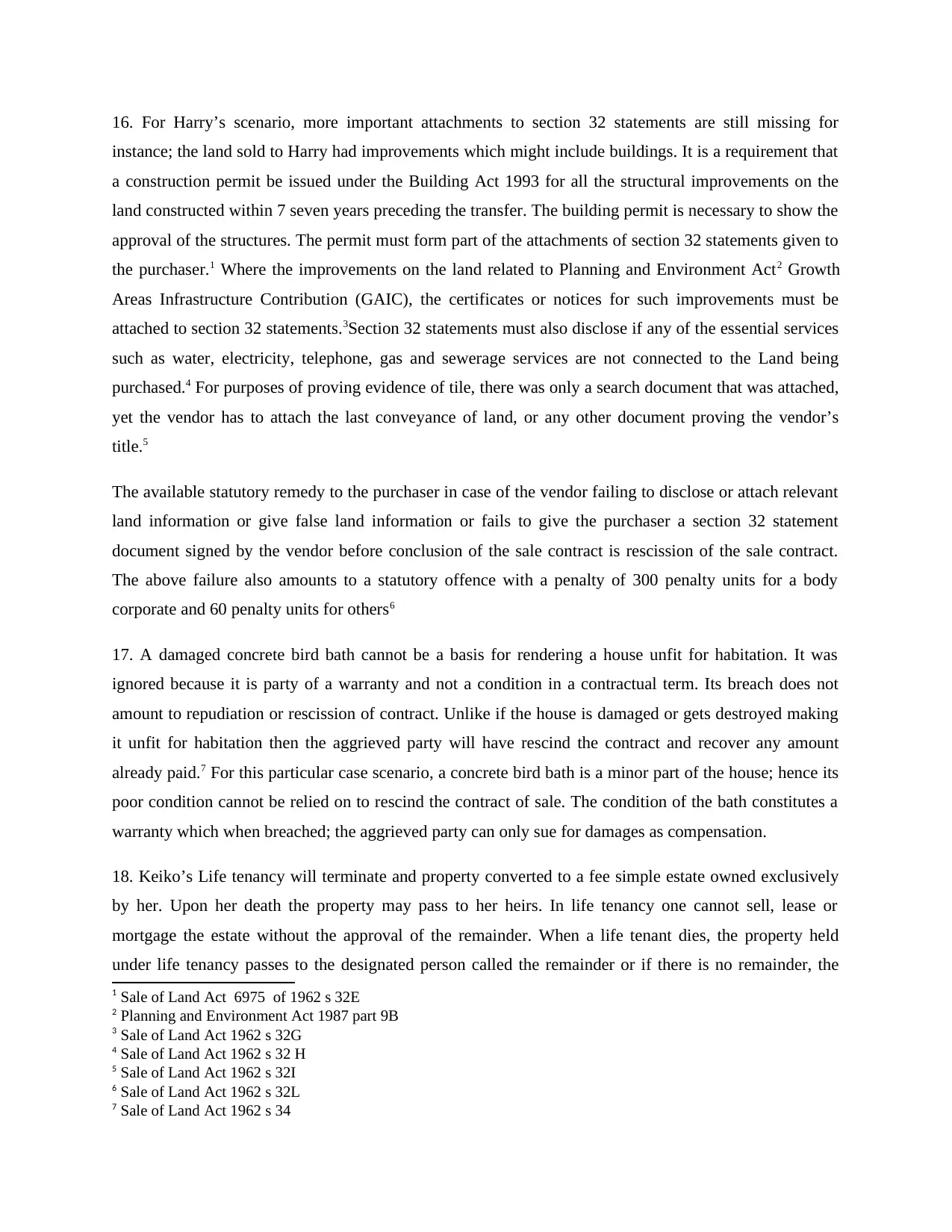
16. For Harry’s scenario, more important attachments to section 32 statements are still missing for
instance; the land sold to Harry had improvements which might include buildings. It is a requirement that
a construction permit be issued under the Building Act 1993 for all the structural improvements on the
land constructed within 7 seven years preceding the transfer. The building permit is necessary to show the
approval of the structures. The permit must form part of the attachments of section 32 statements given to
the purchaser.1 Where the improvements on the land related to Planning and Environment Act2 Growth
Areas Infrastructure Contribution (GAIC), the certificates or notices for such improvements must be
attached to section 32 statements.3Section 32 statements must also disclose if any of the essential services
such as water, electricity, telephone, gas and sewerage services are not connected to the Land being
purchased.4 For purposes of proving evidence of tile, there was only a search document that was attached,
yet the vendor has to attach the last conveyance of land, or any other document proving the vendor’s
title.5
The available statutory remedy to the purchaser in case of the vendor failing to disclose or attach relevant
land information or give false land information or fails to give the purchaser a section 32 statement
document signed by the vendor before conclusion of the sale contract is rescission of the sale contract.
The above failure also amounts to a statutory offence with a penalty of 300 penalty units for a body
corporate and 60 penalty units for others6
17. A damaged concrete bird bath cannot be a basis for rendering a house unfit for habitation. It was
ignored because it is party of a warranty and not a condition in a contractual term. Its breach does not
amount to repudiation or rescission of contract. Unlike if the house is damaged or gets destroyed making
it unfit for habitation then the aggrieved party will have rescind the contract and recover any amount
already paid.7 For this particular case scenario, a concrete bird bath is a minor part of the house; hence its
poor condition cannot be relied on to rescind the contract of sale. The condition of the bath constitutes a
warranty which when breached; the aggrieved party can only sue for damages as compensation.
18. Keiko’s Life tenancy will terminate and property converted to a fee simple estate owned exclusively
by her. Upon her death the property may pass to her heirs. In life tenancy one cannot sell, lease or
mortgage the estate without the approval of the remainder. When a life tenant dies, the property held
under life tenancy passes to the designated person called the remainder or if there is no remainder, the
1 Sale of Land Act 6975 of 1962 s 32E
2 Planning and Environment Act 1987 part 9B
3 Sale of Land Act 1962 s 32G
4 Sale of Land Act 1962 s 32 H
5 Sale of Land Act 1962 s 32I
6 Sale of Land Act 1962 s 32L
7 Sale of Land Act 1962 s 34
instance; the land sold to Harry had improvements which might include buildings. It is a requirement that
a construction permit be issued under the Building Act 1993 for all the structural improvements on the
land constructed within 7 seven years preceding the transfer. The building permit is necessary to show the
approval of the structures. The permit must form part of the attachments of section 32 statements given to
the purchaser.1 Where the improvements on the land related to Planning and Environment Act2 Growth
Areas Infrastructure Contribution (GAIC), the certificates or notices for such improvements must be
attached to section 32 statements.3Section 32 statements must also disclose if any of the essential services
such as water, electricity, telephone, gas and sewerage services are not connected to the Land being
purchased.4 For purposes of proving evidence of tile, there was only a search document that was attached,
yet the vendor has to attach the last conveyance of land, or any other document proving the vendor’s
title.5
The available statutory remedy to the purchaser in case of the vendor failing to disclose or attach relevant
land information or give false land information or fails to give the purchaser a section 32 statement
document signed by the vendor before conclusion of the sale contract is rescission of the sale contract.
The above failure also amounts to a statutory offence with a penalty of 300 penalty units for a body
corporate and 60 penalty units for others6
17. A damaged concrete bird bath cannot be a basis for rendering a house unfit for habitation. It was
ignored because it is party of a warranty and not a condition in a contractual term. Its breach does not
amount to repudiation or rescission of contract. Unlike if the house is damaged or gets destroyed making
it unfit for habitation then the aggrieved party will have rescind the contract and recover any amount
already paid.7 For this particular case scenario, a concrete bird bath is a minor part of the house; hence its
poor condition cannot be relied on to rescind the contract of sale. The condition of the bath constitutes a
warranty which when breached; the aggrieved party can only sue for damages as compensation.
18. Keiko’s Life tenancy will terminate and property converted to a fee simple estate owned exclusively
by her. Upon her death the property may pass to her heirs. In life tenancy one cannot sell, lease or
mortgage the estate without the approval of the remainder. When a life tenant dies, the property held
under life tenancy passes to the designated person called the remainder or if there is no remainder, the
1 Sale of Land Act 6975 of 1962 s 32E
2 Planning and Environment Act 1987 part 9B
3 Sale of Land Act 1962 s 32G
4 Sale of Land Act 1962 s 32 H
5 Sale of Land Act 1962 s 32I
6 Sale of Land Act 1962 s 32L
7 Sale of Land Act 1962 s 34
Paraphrase This Document
Need a fresh take? Get an instant paraphrase of this document with our AI Paraphraser
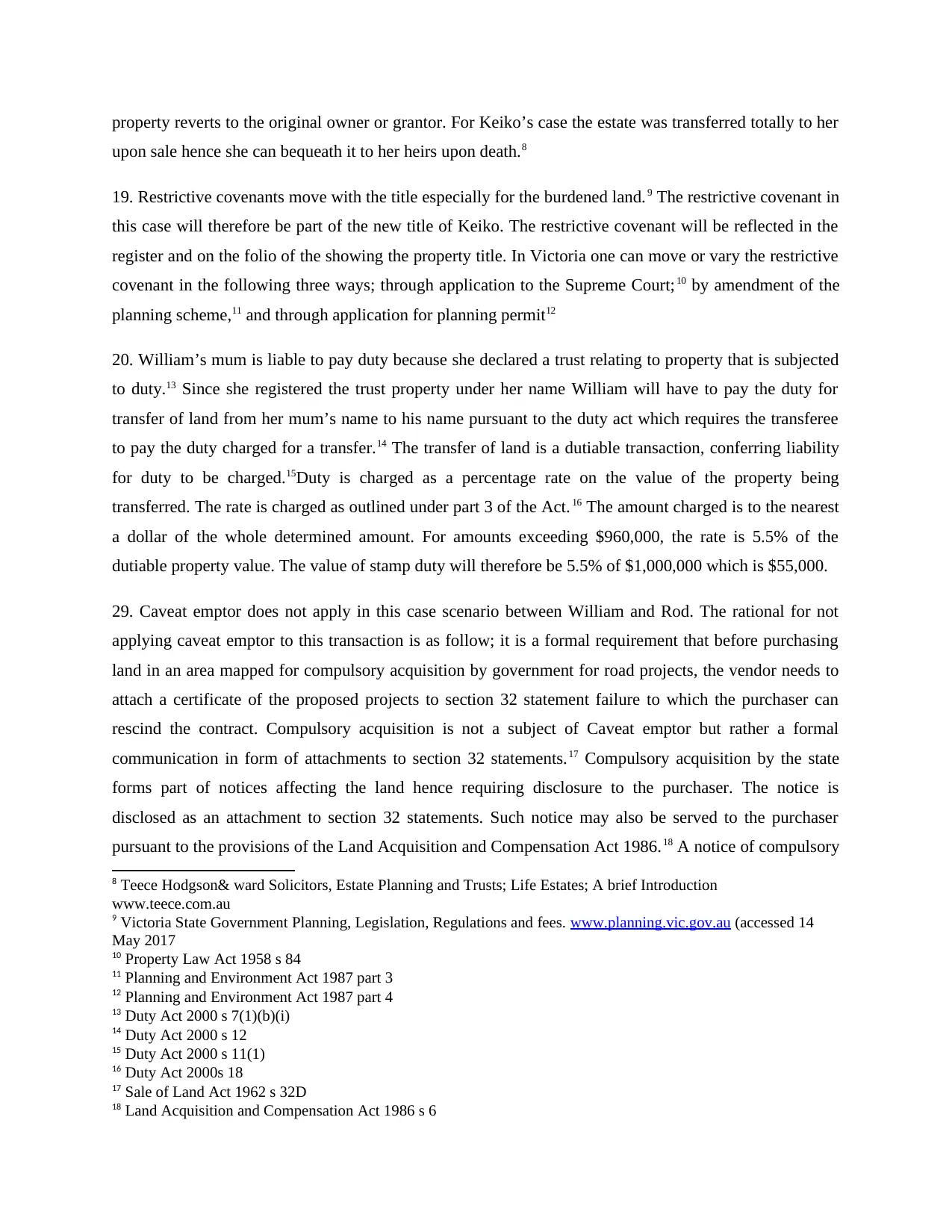
property reverts to the original owner or grantor. For Keiko’s case the estate was transferred totally to her
upon sale hence she can bequeath it to her heirs upon death.8
19. Restrictive covenants move with the title especially for the burdened land.9 The restrictive covenant in
this case will therefore be part of the new title of Keiko. The restrictive covenant will be reflected in the
register and on the folio of the showing the property title. In Victoria one can move or vary the restrictive
covenant in the following three ways; through application to the Supreme Court;10 by amendment of the
planning scheme,11 and through application for planning permit12
20. William’s mum is liable to pay duty because she declared a trust relating to property that is subjected
to duty.13 Since she registered the trust property under her name William will have to pay the duty for
transfer of land from her mum’s name to his name pursuant to the duty act which requires the transferee
to pay the duty charged for a transfer.14 The transfer of land is a dutiable transaction, conferring liability
for duty to be charged.15Duty is charged as a percentage rate on the value of the property being
transferred. The rate is charged as outlined under part 3 of the Act. 16 The amount charged is to the nearest
a dollar of the whole determined amount. For amounts exceeding $960,000, the rate is 5.5% of the
dutiable property value. The value of stamp duty will therefore be 5.5% of $1,000,000 which is $55,000.
29. Caveat emptor does not apply in this case scenario between William and Rod. The rational for not
applying caveat emptor to this transaction is as follow; it is a formal requirement that before purchasing
land in an area mapped for compulsory acquisition by government for road projects, the vendor needs to
attach a certificate of the proposed projects to section 32 statement failure to which the purchaser can
rescind the contract. Compulsory acquisition is not a subject of Caveat emptor but rather a formal
communication in form of attachments to section 32 statements.17 Compulsory acquisition by the state
forms part of notices affecting the land hence requiring disclosure to the purchaser. The notice is
disclosed as an attachment to section 32 statements. Such notice may also be served to the purchaser
pursuant to the provisions of the Land Acquisition and Compensation Act 1986.18 A notice of compulsory
8 Teece Hodgson& ward Solicitors, Estate Planning and Trusts; Life Estates; A brief Introduction
www.teece.com.au
9 Victoria State Government Planning, Legislation, Regulations and fees. www.planning.vic.gov.au (accessed 14
May 2017
10 Property Law Act 1958 s 84
11 Planning and Environment Act 1987 part 3
12 Planning and Environment Act 1987 part 4
13 Duty Act 2000 s 7(1)(b)(i)
14 Duty Act 2000 s 12
15 Duty Act 2000 s 11(1)
16 Duty Act 2000s 18
17 Sale of Land Act 1962 s 32D
18 Land Acquisition and Compensation Act 1986 s 6
upon sale hence she can bequeath it to her heirs upon death.8
19. Restrictive covenants move with the title especially for the burdened land.9 The restrictive covenant in
this case will therefore be part of the new title of Keiko. The restrictive covenant will be reflected in the
register and on the folio of the showing the property title. In Victoria one can move or vary the restrictive
covenant in the following three ways; through application to the Supreme Court;10 by amendment of the
planning scheme,11 and through application for planning permit12
20. William’s mum is liable to pay duty because she declared a trust relating to property that is subjected
to duty.13 Since she registered the trust property under her name William will have to pay the duty for
transfer of land from her mum’s name to his name pursuant to the duty act which requires the transferee
to pay the duty charged for a transfer.14 The transfer of land is a dutiable transaction, conferring liability
for duty to be charged.15Duty is charged as a percentage rate on the value of the property being
transferred. The rate is charged as outlined under part 3 of the Act. 16 The amount charged is to the nearest
a dollar of the whole determined amount. For amounts exceeding $960,000, the rate is 5.5% of the
dutiable property value. The value of stamp duty will therefore be 5.5% of $1,000,000 which is $55,000.
29. Caveat emptor does not apply in this case scenario between William and Rod. The rational for not
applying caveat emptor to this transaction is as follow; it is a formal requirement that before purchasing
land in an area mapped for compulsory acquisition by government for road projects, the vendor needs to
attach a certificate of the proposed projects to section 32 statement failure to which the purchaser can
rescind the contract. Compulsory acquisition is not a subject of Caveat emptor but rather a formal
communication in form of attachments to section 32 statements.17 Compulsory acquisition by the state
forms part of notices affecting the land hence requiring disclosure to the purchaser. The notice is
disclosed as an attachment to section 32 statements. Such notice may also be served to the purchaser
pursuant to the provisions of the Land Acquisition and Compensation Act 1986.18 A notice of compulsory
8 Teece Hodgson& ward Solicitors, Estate Planning and Trusts; Life Estates; A brief Introduction
www.teece.com.au
9 Victoria State Government Planning, Legislation, Regulations and fees. www.planning.vic.gov.au (accessed 14
May 2017
10 Property Law Act 1958 s 84
11 Planning and Environment Act 1987 part 3
12 Planning and Environment Act 1987 part 4
13 Duty Act 2000 s 7(1)(b)(i)
14 Duty Act 2000 s 12
15 Duty Act 2000 s 11(1)
16 Duty Act 2000s 18
17 Sale of Land Act 1962 s 32D
18 Land Acquisition and Compensation Act 1986 s 6
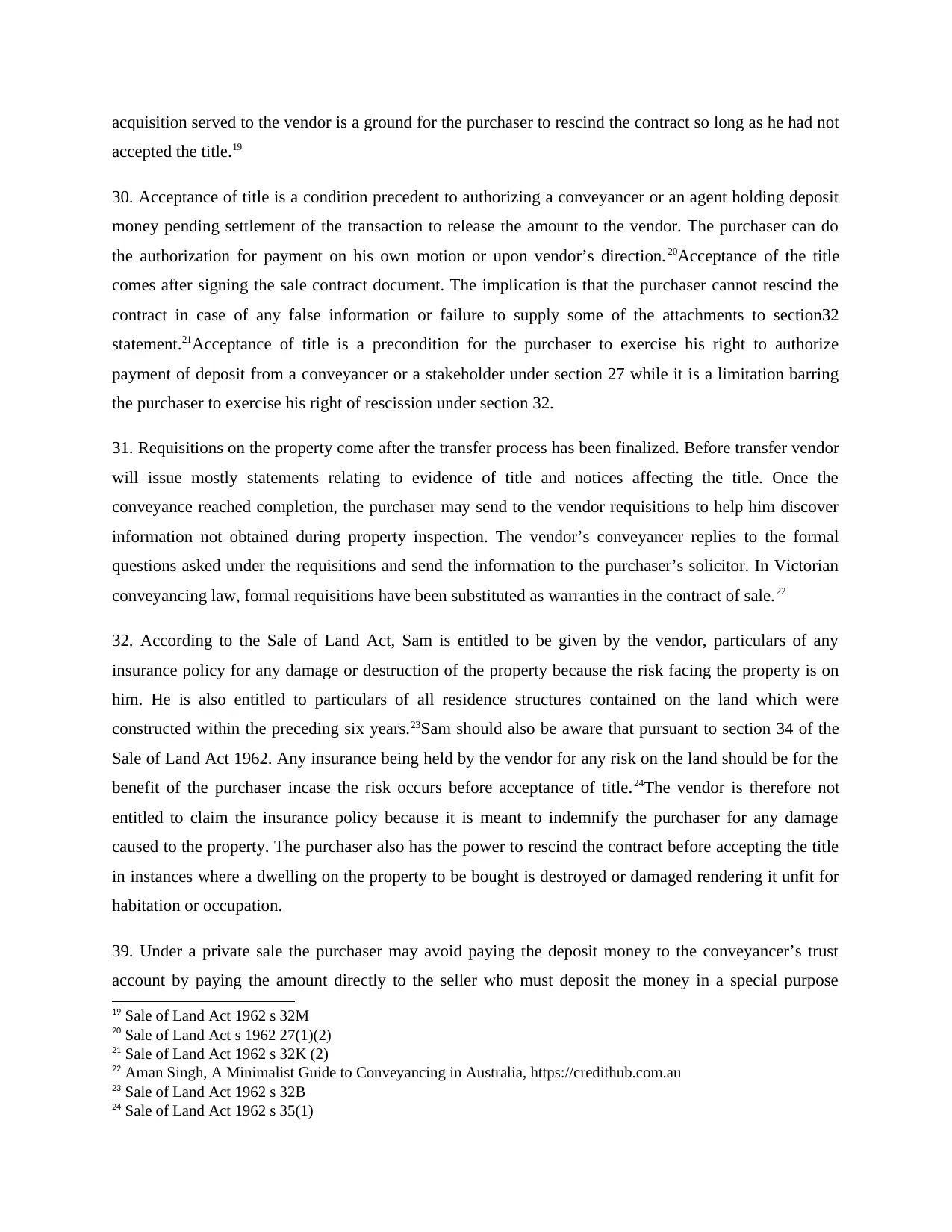
acquisition served to the vendor is a ground for the purchaser to rescind the contract so long as he had not
accepted the title.19
30. Acceptance of title is a condition precedent to authorizing a conveyancer or an agent holding deposit
money pending settlement of the transaction to release the amount to the vendor. The purchaser can do
the authorization for payment on his own motion or upon vendor’s direction. 20Acceptance of the title
comes after signing the sale contract document. The implication is that the purchaser cannot rescind the
contract in case of any false information or failure to supply some of the attachments to section32
statement.21Acceptance of title is a precondition for the purchaser to exercise his right to authorize
payment of deposit from a conveyancer or a stakeholder under section 27 while it is a limitation barring
the purchaser to exercise his right of rescission under section 32.
31. Requisitions on the property come after the transfer process has been finalized. Before transfer vendor
will issue mostly statements relating to evidence of title and notices affecting the title. Once the
conveyance reached completion, the purchaser may send to the vendor requisitions to help him discover
information not obtained during property inspection. The vendor’s conveyancer replies to the formal
questions asked under the requisitions and send the information to the purchaser’s solicitor. In Victorian
conveyancing law, formal requisitions have been substituted as warranties in the contract of sale.22
32. According to the Sale of Land Act, Sam is entitled to be given by the vendor, particulars of any
insurance policy for any damage or destruction of the property because the risk facing the property is on
him. He is also entitled to particulars of all residence structures contained on the land which were
constructed within the preceding six years.23Sam should also be aware that pursuant to section 34 of the
Sale of Land Act 1962. Any insurance being held by the vendor for any risk on the land should be for the
benefit of the purchaser incase the risk occurs before acceptance of title.24The vendor is therefore not
entitled to claim the insurance policy because it is meant to indemnify the purchaser for any damage
caused to the property. The purchaser also has the power to rescind the contract before accepting the title
in instances where a dwelling on the property to be bought is destroyed or damaged rendering it unfit for
habitation or occupation.
39. Under a private sale the purchaser may avoid paying the deposit money to the conveyancer’s trust
account by paying the amount directly to the seller who must deposit the money in a special purpose
19 Sale of Land Act 1962 s 32M
20 Sale of Land Act s 1962 27(1)(2)
21 Sale of Land Act 1962 s 32K (2)
22 Aman Singh, A Minimalist Guide to Conveyancing in Australia, https://credithub.com.au
23 Sale of Land Act 1962 s 32B
24 Sale of Land Act 1962 s 35(1)
accepted the title.19
30. Acceptance of title is a condition precedent to authorizing a conveyancer or an agent holding deposit
money pending settlement of the transaction to release the amount to the vendor. The purchaser can do
the authorization for payment on his own motion or upon vendor’s direction. 20Acceptance of the title
comes after signing the sale contract document. The implication is that the purchaser cannot rescind the
contract in case of any false information or failure to supply some of the attachments to section32
statement.21Acceptance of title is a precondition for the purchaser to exercise his right to authorize
payment of deposit from a conveyancer or a stakeholder under section 27 while it is a limitation barring
the purchaser to exercise his right of rescission under section 32.
31. Requisitions on the property come after the transfer process has been finalized. Before transfer vendor
will issue mostly statements relating to evidence of title and notices affecting the title. Once the
conveyance reached completion, the purchaser may send to the vendor requisitions to help him discover
information not obtained during property inspection. The vendor’s conveyancer replies to the formal
questions asked under the requisitions and send the information to the purchaser’s solicitor. In Victorian
conveyancing law, formal requisitions have been substituted as warranties in the contract of sale.22
32. According to the Sale of Land Act, Sam is entitled to be given by the vendor, particulars of any
insurance policy for any damage or destruction of the property because the risk facing the property is on
him. He is also entitled to particulars of all residence structures contained on the land which were
constructed within the preceding six years.23Sam should also be aware that pursuant to section 34 of the
Sale of Land Act 1962. Any insurance being held by the vendor for any risk on the land should be for the
benefit of the purchaser incase the risk occurs before acceptance of title.24The vendor is therefore not
entitled to claim the insurance policy because it is meant to indemnify the purchaser for any damage
caused to the property. The purchaser also has the power to rescind the contract before accepting the title
in instances where a dwelling on the property to be bought is destroyed or damaged rendering it unfit for
habitation or occupation.
39. Under a private sale the purchaser may avoid paying the deposit money to the conveyancer’s trust
account by paying the amount directly to the seller who must deposit the money in a special purpose
19 Sale of Land Act 1962 s 32M
20 Sale of Land Act s 1962 27(1)(2)
21 Sale of Land Act 1962 s 32K (2)
22 Aman Singh, A Minimalist Guide to Conveyancing in Australia, https://credithub.com.au
23 Sale of Land Act 1962 s 32B
24 Sale of Land Act 1962 s 35(1)
⊘ This is a preview!⊘
Do you want full access?
Subscribe today to unlock all pages.

Trusted by 1+ million students worldwide
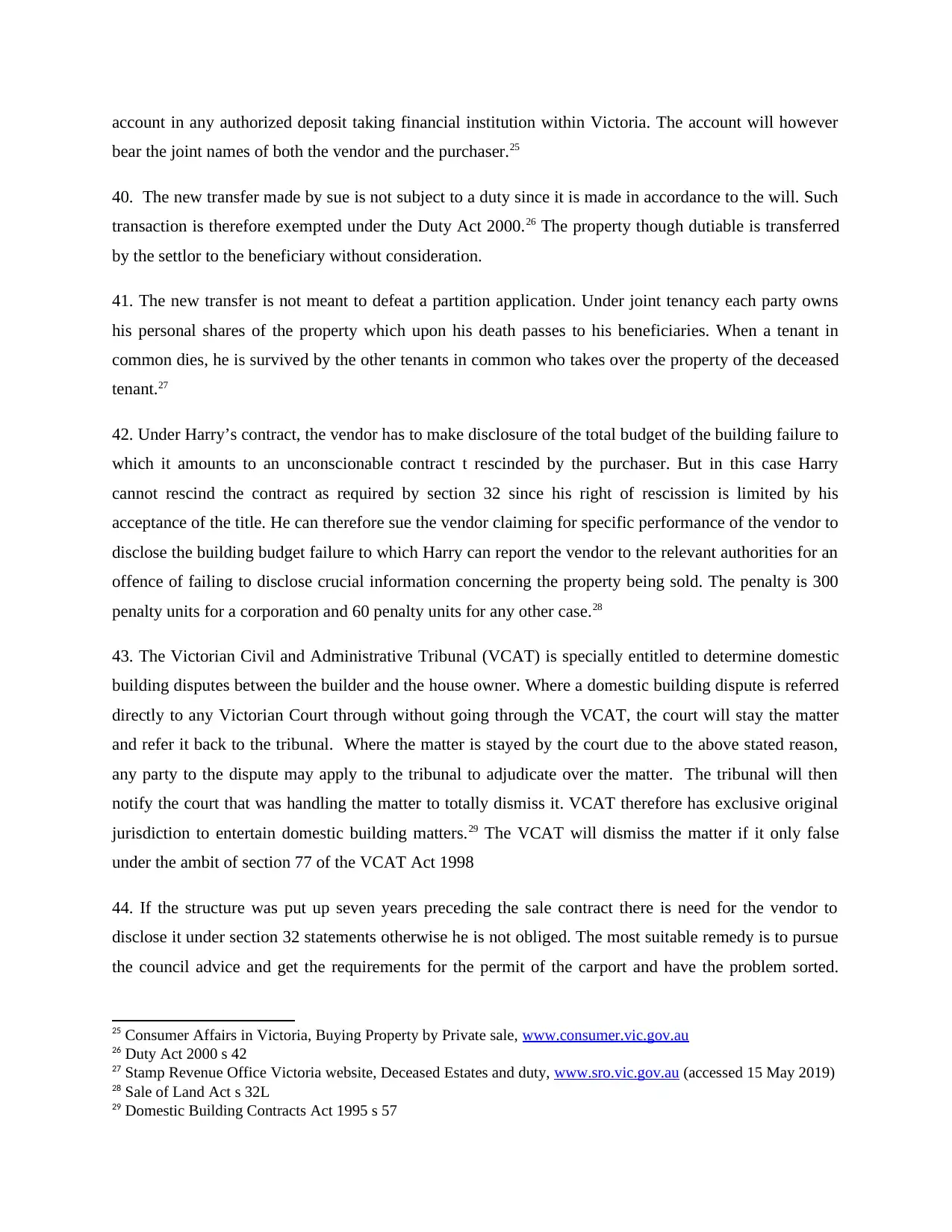
account in any authorized deposit taking financial institution within Victoria. The account will however
bear the joint names of both the vendor and the purchaser.25
40. The new transfer made by sue is not subject to a duty since it is made in accordance to the will. Such
transaction is therefore exempted under the Duty Act 2000.26 The property though dutiable is transferred
by the settlor to the beneficiary without consideration.
41. The new transfer is not meant to defeat a partition application. Under joint tenancy each party owns
his personal shares of the property which upon his death passes to his beneficiaries. When a tenant in
common dies, he is survived by the other tenants in common who takes over the property of the deceased
tenant.27
42. Under Harry’s contract, the vendor has to make disclosure of the total budget of the building failure to
which it amounts to an unconscionable contract t rescinded by the purchaser. But in this case Harry
cannot rescind the contract as required by section 32 since his right of rescission is limited by his
acceptance of the title. He can therefore sue the vendor claiming for specific performance of the vendor to
disclose the building budget failure to which Harry can report the vendor to the relevant authorities for an
offence of failing to disclose crucial information concerning the property being sold. The penalty is 300
penalty units for a corporation and 60 penalty units for any other case.28
43. The Victorian Civil and Administrative Tribunal (VCAT) is specially entitled to determine domestic
building disputes between the builder and the house owner. Where a domestic building dispute is referred
directly to any Victorian Court through without going through the VCAT, the court will stay the matter
and refer it back to the tribunal. Where the matter is stayed by the court due to the above stated reason,
any party to the dispute may apply to the tribunal to adjudicate over the matter. The tribunal will then
notify the court that was handling the matter to totally dismiss it. VCAT therefore has exclusive original
jurisdiction to entertain domestic building matters.29 The VCAT will dismiss the matter if it only false
under the ambit of section 77 of the VCAT Act 1998
44. If the structure was put up seven years preceding the sale contract there is need for the vendor to
disclose it under section 32 statements otherwise he is not obliged. The most suitable remedy is to pursue
the council advice and get the requirements for the permit of the carport and have the problem sorted.
25 Consumer Affairs in Victoria, Buying Property by Private sale, www.consumer.vic.gov.au
26 Duty Act 2000 s 42
27 Stamp Revenue Office Victoria website, Deceased Estates and duty, www.sro.vic.gov.au (accessed 15 May 2019)
28 Sale of Land Act s 32L
29 Domestic Building Contracts Act 1995 s 57
bear the joint names of both the vendor and the purchaser.25
40. The new transfer made by sue is not subject to a duty since it is made in accordance to the will. Such
transaction is therefore exempted under the Duty Act 2000.26 The property though dutiable is transferred
by the settlor to the beneficiary without consideration.
41. The new transfer is not meant to defeat a partition application. Under joint tenancy each party owns
his personal shares of the property which upon his death passes to his beneficiaries. When a tenant in
common dies, he is survived by the other tenants in common who takes over the property of the deceased
tenant.27
42. Under Harry’s contract, the vendor has to make disclosure of the total budget of the building failure to
which it amounts to an unconscionable contract t rescinded by the purchaser. But in this case Harry
cannot rescind the contract as required by section 32 since his right of rescission is limited by his
acceptance of the title. He can therefore sue the vendor claiming for specific performance of the vendor to
disclose the building budget failure to which Harry can report the vendor to the relevant authorities for an
offence of failing to disclose crucial information concerning the property being sold. The penalty is 300
penalty units for a corporation and 60 penalty units for any other case.28
43. The Victorian Civil and Administrative Tribunal (VCAT) is specially entitled to determine domestic
building disputes between the builder and the house owner. Where a domestic building dispute is referred
directly to any Victorian Court through without going through the VCAT, the court will stay the matter
and refer it back to the tribunal. Where the matter is stayed by the court due to the above stated reason,
any party to the dispute may apply to the tribunal to adjudicate over the matter. The tribunal will then
notify the court that was handling the matter to totally dismiss it. VCAT therefore has exclusive original
jurisdiction to entertain domestic building matters.29 The VCAT will dismiss the matter if it only false
under the ambit of section 77 of the VCAT Act 1998
44. If the structure was put up seven years preceding the sale contract there is need for the vendor to
disclose it under section 32 statements otherwise he is not obliged. The most suitable remedy is to pursue
the council advice and get the requirements for the permit of the carport and have the problem sorted.
25 Consumer Affairs in Victoria, Buying Property by Private sale, www.consumer.vic.gov.au
26 Duty Act 2000 s 42
27 Stamp Revenue Office Victoria website, Deceased Estates and duty, www.sro.vic.gov.au (accessed 15 May 2019)
28 Sale of Land Act s 32L
29 Domestic Building Contracts Act 1995 s 57
Paraphrase This Document
Need a fresh take? Get an instant paraphrase of this document with our AI Paraphraser
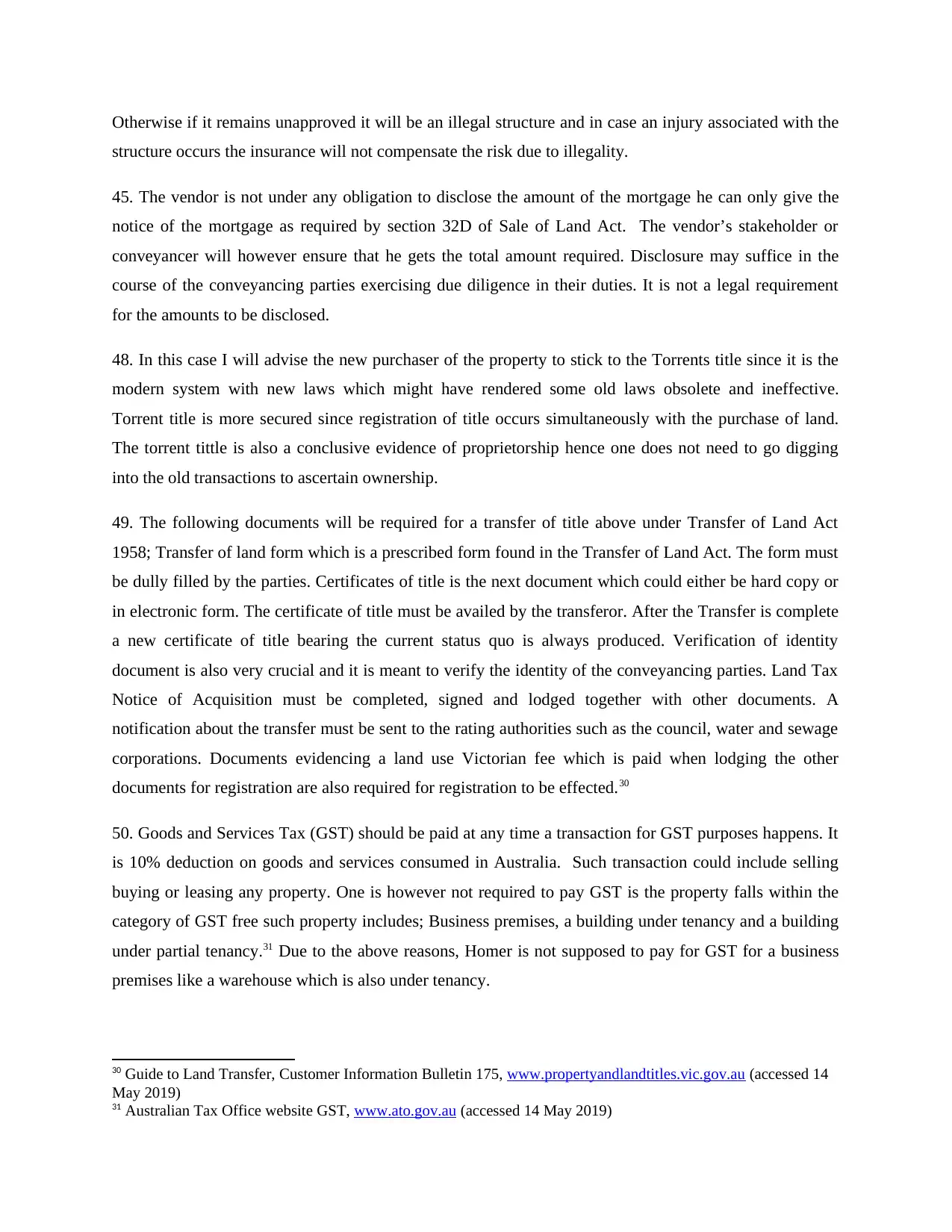
Otherwise if it remains unapproved it will be an illegal structure and in case an injury associated with the
structure occurs the insurance will not compensate the risk due to illegality.
45. The vendor is not under any obligation to disclose the amount of the mortgage he can only give the
notice of the mortgage as required by section 32D of Sale of Land Act. The vendor’s stakeholder or
conveyancer will however ensure that he gets the total amount required. Disclosure may suffice in the
course of the conveyancing parties exercising due diligence in their duties. It is not a legal requirement
for the amounts to be disclosed.
48. In this case I will advise the new purchaser of the property to stick to the Torrents title since it is the
modern system with new laws which might have rendered some old laws obsolete and ineffective.
Torrent title is more secured since registration of title occurs simultaneously with the purchase of land.
The torrent tittle is also a conclusive evidence of proprietorship hence one does not need to go digging
into the old transactions to ascertain ownership.
49. The following documents will be required for a transfer of title above under Transfer of Land Act
1958; Transfer of land form which is a prescribed form found in the Transfer of Land Act. The form must
be dully filled by the parties. Certificates of title is the next document which could either be hard copy or
in electronic form. The certificate of title must be availed by the transferor. After the Transfer is complete
a new certificate of title bearing the current status quo is always produced. Verification of identity
document is also very crucial and it is meant to verify the identity of the conveyancing parties. Land Tax
Notice of Acquisition must be completed, signed and lodged together with other documents. A
notification about the transfer must be sent to the rating authorities such as the council, water and sewage
corporations. Documents evidencing a land use Victorian fee which is paid when lodging the other
documents for registration are also required for registration to be effected.30
50. Goods and Services Tax (GST) should be paid at any time a transaction for GST purposes happens. It
is 10% deduction on goods and services consumed in Australia. Such transaction could include selling
buying or leasing any property. One is however not required to pay GST is the property falls within the
category of GST free such property includes; Business premises, a building under tenancy and a building
under partial tenancy.31 Due to the above reasons, Homer is not supposed to pay for GST for a business
premises like a warehouse which is also under tenancy.
30 Guide to Land Transfer, Customer Information Bulletin 175, www.propertyandlandtitles.vic.gov.au (accessed 14
May 2019)
31 Australian Tax Office website GST, www.ato.gov.au (accessed 14 May 2019)
structure occurs the insurance will not compensate the risk due to illegality.
45. The vendor is not under any obligation to disclose the amount of the mortgage he can only give the
notice of the mortgage as required by section 32D of Sale of Land Act. The vendor’s stakeholder or
conveyancer will however ensure that he gets the total amount required. Disclosure may suffice in the
course of the conveyancing parties exercising due diligence in their duties. It is not a legal requirement
for the amounts to be disclosed.
48. In this case I will advise the new purchaser of the property to stick to the Torrents title since it is the
modern system with new laws which might have rendered some old laws obsolete and ineffective.
Torrent title is more secured since registration of title occurs simultaneously with the purchase of land.
The torrent tittle is also a conclusive evidence of proprietorship hence one does not need to go digging
into the old transactions to ascertain ownership.
49. The following documents will be required for a transfer of title above under Transfer of Land Act
1958; Transfer of land form which is a prescribed form found in the Transfer of Land Act. The form must
be dully filled by the parties. Certificates of title is the next document which could either be hard copy or
in electronic form. The certificate of title must be availed by the transferor. After the Transfer is complete
a new certificate of title bearing the current status quo is always produced. Verification of identity
document is also very crucial and it is meant to verify the identity of the conveyancing parties. Land Tax
Notice of Acquisition must be completed, signed and lodged together with other documents. A
notification about the transfer must be sent to the rating authorities such as the council, water and sewage
corporations. Documents evidencing a land use Victorian fee which is paid when lodging the other
documents for registration are also required for registration to be effected.30
50. Goods and Services Tax (GST) should be paid at any time a transaction for GST purposes happens. It
is 10% deduction on goods and services consumed in Australia. Such transaction could include selling
buying or leasing any property. One is however not required to pay GST is the property falls within the
category of GST free such property includes; Business premises, a building under tenancy and a building
under partial tenancy.31 Due to the above reasons, Homer is not supposed to pay for GST for a business
premises like a warehouse which is also under tenancy.
30 Guide to Land Transfer, Customer Information Bulletin 175, www.propertyandlandtitles.vic.gov.au (accessed 14
May 2019)
31 Australian Tax Office website GST, www.ato.gov.au (accessed 14 May 2019)
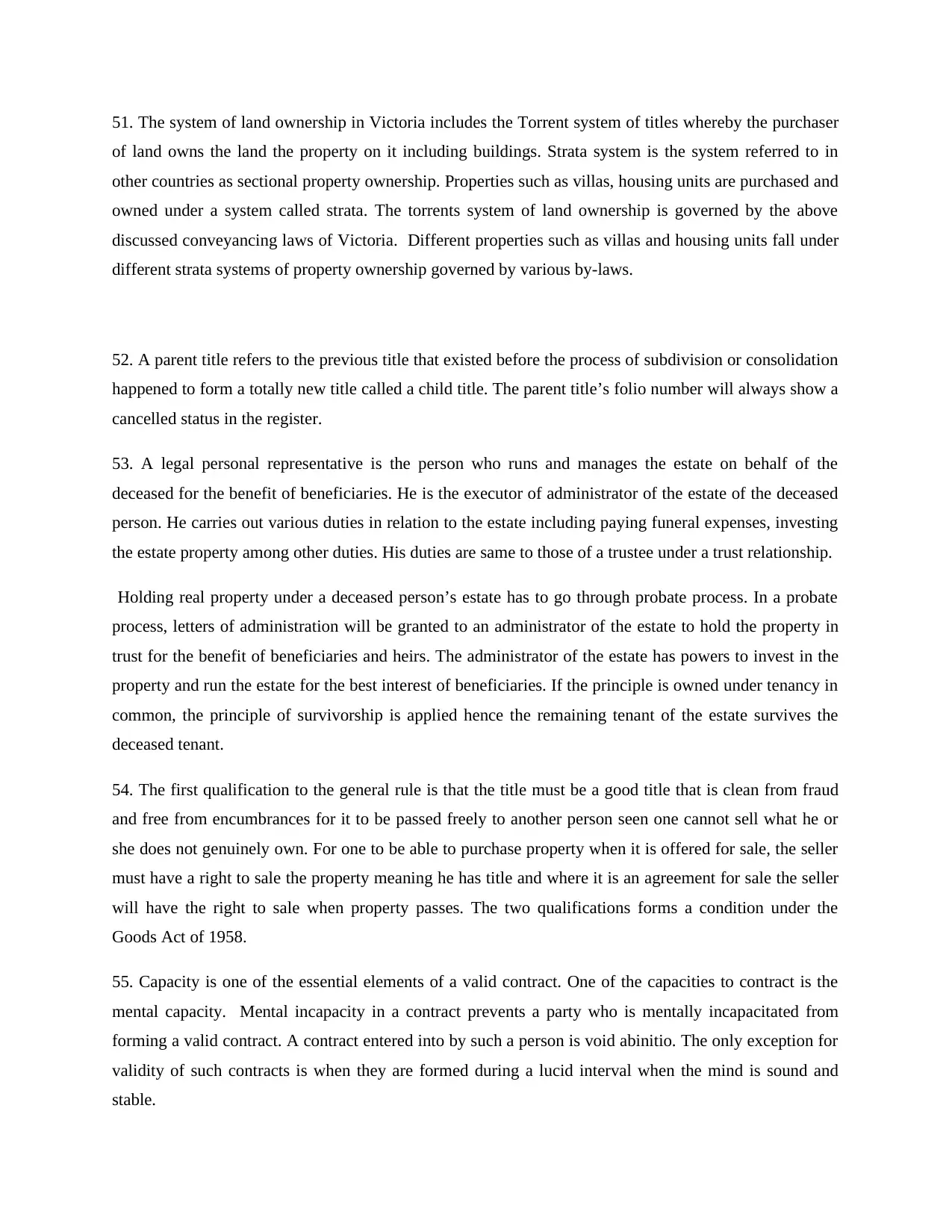
51. The system of land ownership in Victoria includes the Torrent system of titles whereby the purchaser
of land owns the land the property on it including buildings. Strata system is the system referred to in
other countries as sectional property ownership. Properties such as villas, housing units are purchased and
owned under a system called strata. The torrents system of land ownership is governed by the above
discussed conveyancing laws of Victoria. Different properties such as villas and housing units fall under
different strata systems of property ownership governed by various by-laws.
52. A parent title refers to the previous title that existed before the process of subdivision or consolidation
happened to form a totally new title called a child title. The parent title’s folio number will always show a
cancelled status in the register.
53. A legal personal representative is the person who runs and manages the estate on behalf of the
deceased for the benefit of beneficiaries. He is the executor of administrator of the estate of the deceased
person. He carries out various duties in relation to the estate including paying funeral expenses, investing
the estate property among other duties. His duties are same to those of a trustee under a trust relationship.
Holding real property under a deceased person’s estate has to go through probate process. In a probate
process, letters of administration will be granted to an administrator of the estate to hold the property in
trust for the benefit of beneficiaries and heirs. The administrator of the estate has powers to invest in the
property and run the estate for the best interest of beneficiaries. If the principle is owned under tenancy in
common, the principle of survivorship is applied hence the remaining tenant of the estate survives the
deceased tenant.
54. The first qualification to the general rule is that the title must be a good title that is clean from fraud
and free from encumbrances for it to be passed freely to another person seen one cannot sell what he or
she does not genuinely own. For one to be able to purchase property when it is offered for sale, the seller
must have a right to sale the property meaning he has title and where it is an agreement for sale the seller
will have the right to sale when property passes. The two qualifications forms a condition under the
Goods Act of 1958.
55. Capacity is one of the essential elements of a valid contract. One of the capacities to contract is the
mental capacity. Mental incapacity in a contract prevents a party who is mentally incapacitated from
forming a valid contract. A contract entered into by such a person is void abinitio. The only exception for
validity of such contracts is when they are formed during a lucid interval when the mind is sound and
stable.
of land owns the land the property on it including buildings. Strata system is the system referred to in
other countries as sectional property ownership. Properties such as villas, housing units are purchased and
owned under a system called strata. The torrents system of land ownership is governed by the above
discussed conveyancing laws of Victoria. Different properties such as villas and housing units fall under
different strata systems of property ownership governed by various by-laws.
52. A parent title refers to the previous title that existed before the process of subdivision or consolidation
happened to form a totally new title called a child title. The parent title’s folio number will always show a
cancelled status in the register.
53. A legal personal representative is the person who runs and manages the estate on behalf of the
deceased for the benefit of beneficiaries. He is the executor of administrator of the estate of the deceased
person. He carries out various duties in relation to the estate including paying funeral expenses, investing
the estate property among other duties. His duties are same to those of a trustee under a trust relationship.
Holding real property under a deceased person’s estate has to go through probate process. In a probate
process, letters of administration will be granted to an administrator of the estate to hold the property in
trust for the benefit of beneficiaries and heirs. The administrator of the estate has powers to invest in the
property and run the estate for the best interest of beneficiaries. If the principle is owned under tenancy in
common, the principle of survivorship is applied hence the remaining tenant of the estate survives the
deceased tenant.
54. The first qualification to the general rule is that the title must be a good title that is clean from fraud
and free from encumbrances for it to be passed freely to another person seen one cannot sell what he or
she does not genuinely own. For one to be able to purchase property when it is offered for sale, the seller
must have a right to sale the property meaning he has title and where it is an agreement for sale the seller
will have the right to sale when property passes. The two qualifications forms a condition under the
Goods Act of 1958.
55. Capacity is one of the essential elements of a valid contract. One of the capacities to contract is the
mental capacity. Mental incapacity in a contract prevents a party who is mentally incapacitated from
forming a valid contract. A contract entered into by such a person is void abinitio. The only exception for
validity of such contracts is when they are formed during a lucid interval when the mind is sound and
stable.
⊘ This is a preview!⊘
Do you want full access?
Subscribe today to unlock all pages.

Trusted by 1+ million students worldwide

1 out of 7
Your All-in-One AI-Powered Toolkit for Academic Success.
+13062052269
info@desklib.com
Available 24*7 on WhatsApp / Email
![[object Object]](/_next/static/media/star-bottom.7253800d.svg)
Unlock your academic potential
Copyright © 2020–2025 A2Z Services. All Rights Reserved. Developed and managed by ZUCOL.

